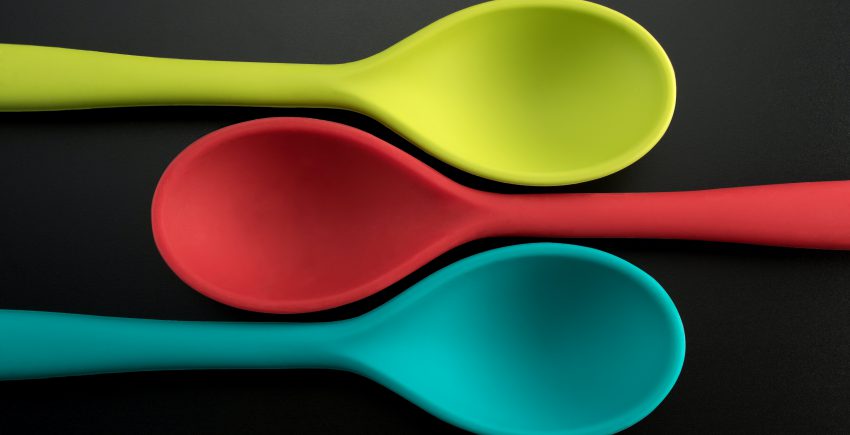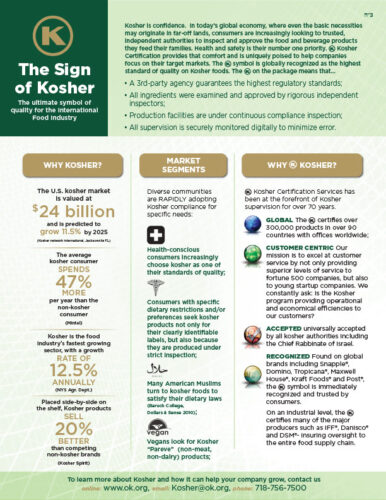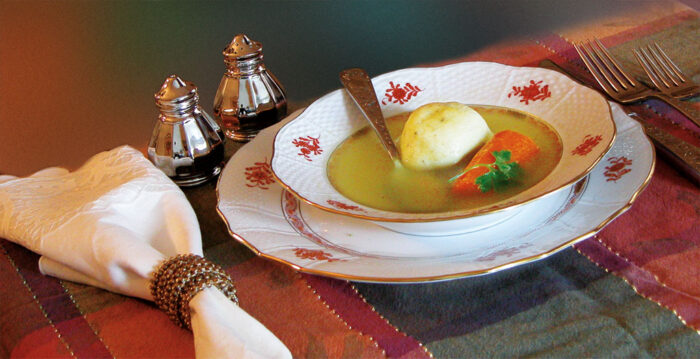
Making The Separation: The definitions of Meat, Dairy and Pareve in the kosher facility.
Let’s start with one of the basics: the distinction of Meat, Dairy and Pareve food categories. The following offers practical information on how a product or establishment can be classified into one of these three types, from a kosher perspective.
Now let’s dig in.
Meat – includes red meat and poultry.
All meat and fowl and their byproducts, such as bones, soup or gravy are classified as Meat. This includes products that contain meat or fowl derivatives such as liver pills.
Items designated “Meat” must meet the following requirements to be considered kosher:
- Kosher meat must come from an animal that chews its cud and has split hooves. (Cows, sheep and goats are kosher; rabbits, kangaroos and fox are not).
- Kosher fowl are identified by a universally accepted tradition and include the domesticated species of chickens, Cornish hens, ducks, geese and turkeys. The Torah names the species of fowl that are forbidden, including all predatory and scavenger birds.
- Animal and fowl must be slaughtered with precision and examined by a skilled shochet, an individual extensively trained in the rituals kosher slaughtering.
- Permissible portions of the animal and fowl must be properly prepared (soaked and to remove any trace of blood) before cooking.
- All utensils used in slaughtering, cleaning, preparing and packaging must be kosher.
Visual learner? Check out our Kosher 101 Slideshows. They’re great tools for regulatory personnel and consumers.
Dairy – Any product containing or made from milk of a kosher animal.
All foods derived from, or containing, milk are classified as dairy, including milk, butter, yogurt and all cheese – hard, soft and cream. Even a trace amount of dairy can cause a food to be considered dairy.
Dairy products must meet the following criteria in order to be certified kosher:
- They must come from a kosher animal.
- All ingredients must be kosher and free of meat derivatives. (Conventional rennet, for instance, is of animal origin and may not be used in kosher dairy.)
- They must be produced, processed and packaged on kosher equipment.
Pareve – Neutral foods, Containing or Prepared With No Trace of Meat or Dairy.
Foods that are neither meat nor dairy are called pareve. Common pareve foods are eggs, fish, fruit, vegetables, grains, unprocessed juices, pasta, soft drinks, coffee and tea and many candies and snacks.
Pareve presents fewer kosher complexities than meat or dairy, but certain points must be known:
- Foods may lose their pareve status if processed on meat or dairy equipment or when additives are used. Pure Chocolate, cookies and other snacks may not be processed with meat or meaty foods unless they are certified pareve.
- Certain fruits, vegetables and grains must be checked for the presence of small insects and larvae, which are not kosher.
- Eggs must be checked for the presence of blood spots, which are not kosher.
“Kosherizing” Equipment for Meat, Dairy and Pareve
Food produced on machinery previously used to produce non-kosher items may be rendered non-kosher. The same applies when alternating between dairy/meat and Pareve productions.
It is sometimes possible to return non-kosher equipment back to kosher status or from dairy back to Pareve. The process of making vessels, utensils, dishes, ovens, and sinks kosher is called “kashering” or “kosherizing.” This is done under the supervision of a rabbi who is trained in the procedure and the process will vary depending on the kind of equipment that is involved as well as its usage.
Want to Get Certified OK Kosher?
Additional Kosher Categories – Other Than Meat, Dairy and Pareve
Passover
The eight-day Jewish holiday of Passover involves a unique set of kosher laws. No leavened products or their derivatives may be consumed by a Jewish person on Passover, even if they are kosher in all other respects. For more detailed insight, you can browse our extensive library of articles about Kosher-for-Passover compliance.
Wine
Special kosher rules govern the production of wine, grape juice or grape-derived products. Even if all ingredients in the wine are of kosher origin, it is kosher only if production was conducted exclusively by Torah-observant Jews.
Non-Kosher Foods
There are many creatures that are not kosher and will never be eligible to become kosher, including most seafood and crustaceans, insects, rodents, scavenger birds, wild animals and their milk, eggs, or other derivatives.
You may also be interested in our Kosher FAQ page, for a bit more on what goes into kosher certification, what it stands for and its importance in the food and beverage industry.
Now that you’re more well informed about the kosher distinctions of meat, dairy and pareve, delve deeper into our knowledge base, or learn about the next steps to obtain kosher certification for your business.
Get Started
Apply for Kosher Certification Now – for Free!


 EN
EN  ZH
ZH  KR
KR  BR
BR  ES
ES  IN
IN  IL
IL 



